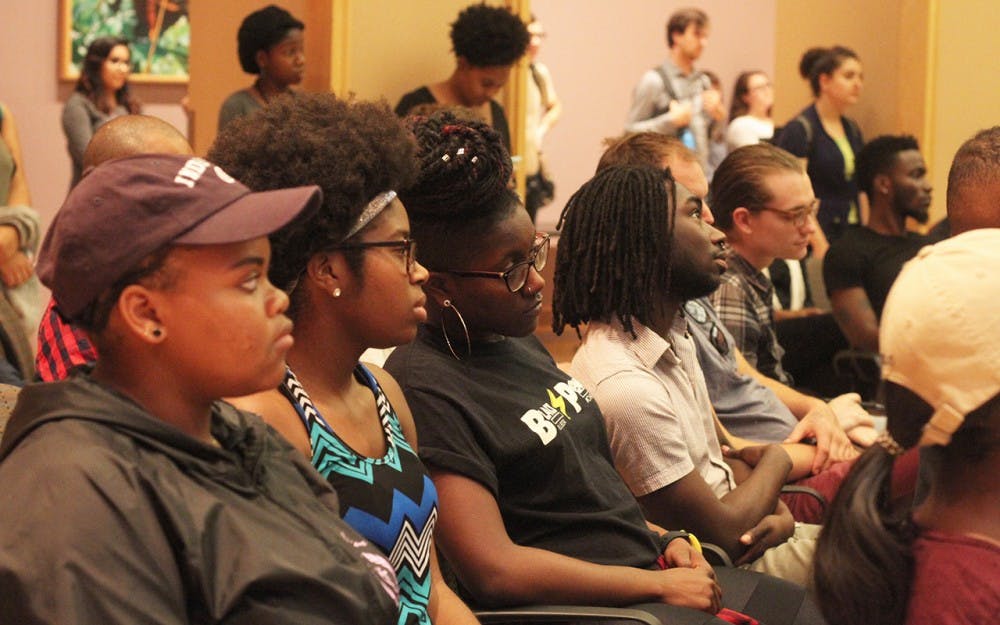After the words ended and before the silence began, those who had filled the Neal-Marshall Black Culture Center Grand Hall spilled onto the dim plaza just outside. They lit candles for every black life, but this moment of illumination belonged especially to Joseph Smedley.
A year has passed since the IU student was reported missing and later found dead. Through invisibility, controversy, grief and healing, a community came together Wednesday night for Our Black Lives Matter: In Remembrance of Joseph Smedley.
“We’re still here,” Joseph’s sister Vivianne Smedley said. “We still care about Joseph. And although some of the other students at IU might have moved on, we haven’t, and we’re still seeking justice for him because we just don’t feel like it got the attention it deserved.”
Vivianne and the IU Black Graduate Student Association joined efforts to organize the memorial and Black Lives Matter event.
“Black Lives Matter, as a concept and as a movement, is not specifically and only about black victims of police brutality,” BGSA President Andrea Sterling said. “It’s what the name is, black lives mattering and the lack of care given when black people go missing or are hurt in various ways. I don’t have the words for it, for that feeling, but it is that feeling that your existence does not matter.”
Sterling said it was that lack of care, the invisible side of a hypervisibility-invisibility dichotomy, that motivated her and others to grieve, remember and look forward together.
“It was this period where we were kind of existing in these different worlds, where there was this great population of students who had high anxiety levels and weren’t sure whether they should be grieving or what,” Sterling said of last fall. “And then you had administrators and faculty and some students who seemed like they had no idea what was going on.”
Vivianne said she was so consumed with the disappearance of her brother that she didn’t think about the way those around her reacted. However, when she later attended a grieving group put on by IU students, something changed.
“That point was when I realized that they really didn’t do much a service to him when it came to communicating to the rest of the campus what was going on,” Vivianne said of the University. “Apparently there were people who didn’t even know he was missing.”
But Nikki Sage knew. Joseph, funny and sarcastic, was a great friend of hers. She remembered unlimited Jiffy Treet runs with him, set to a soundtrack of his favorite smooth jazz.
Sage came to remember all the great times, not the situation, not the tragic ending.
Ben Gonzalez knew, too. Joseph was one of his Sigma Pi fraternity brothers.
Gonzalez came to honor and respect the memory of a friend who died too soon.
And Chantelle Carter and Dexter Clardy knew. They attended high school with Joseph and came to the Grand Hall to continue talking, to show support and to let his family know they don’t believe what they’ve been told about Joseph’s death.
Each of them seated, the lineup of visiting lecturer Maria Hamilton Abegunde, poet London Grant, Professor Amrita Myers, Vivianne Smedley and poets Theon Lee and Mariah Ivey began.
They spoke of the history of institutional racism in the U.S., of 400 years of oppression. They spoke of heavy spirits and exhaustion. They spoke of the power to decide what comes next.
Abegunde compared the daily strain of being black in a place of institutional racism with holding her breath.
“Hold your breath, and keep holding it,” she instructed everyone in the room. “Don’t let anything slip from one nostril.”
She paused.
“And release.”
Sterling said she asked speakers to come to contextualize the evening. She asked poets to come as healers.
“Poetry is healing, even if it’s a poem that makes you angry with how messed up everything is,” Sterling said. “There’s that moment of connection, of someone else putting into words your feelings. So we’re trying for that balance between contextualizing issues and having poetry that is healing and also inspiring.”
She asked Vivianne to come because she deserved a platform on which to speak about her brother’s life and disappearance, as well as her effort to further investigate his case.
“I’m still here, fighting for justice, even though it’s not moving at a fast pace right now,” Vivianne said.




